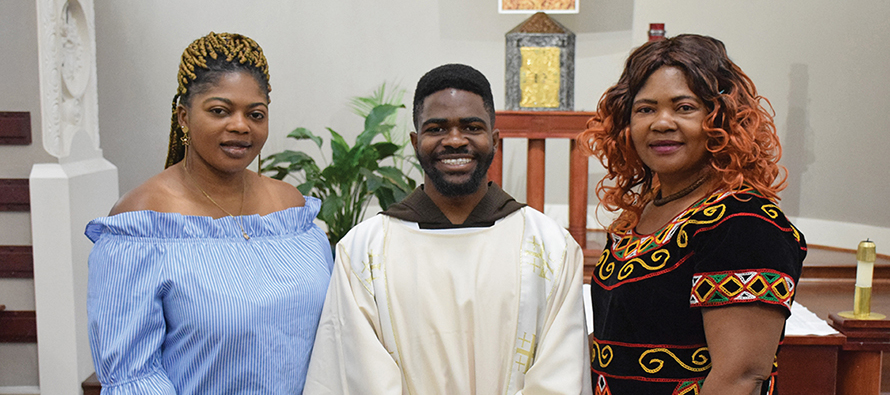How to talk to family about your vocation

Father Rigobel Azanwi, O.F.M.Cap. takes a moment with family members after his solemn vows ceremony. (Photo: Brother Matt Hindelang, O.F.M.Cap.)
A FAMILY CAN SEE IT as a great blessing for a son or daughter to be called to religious life. They can also consider it a threat—or perhaps they find themselves with mixed emotions. If you think God is calling you to be a member of a religious community, but your parents or others are dubious, here are insights for your conversations with them.
Have you listened to the objections your parents or other family members have?
Allow them to tell you what their concerns are. They may want you to have a “normal” life because they think that the celibate life is too hard and unnatural. Parents may want grandchildren. They may think that if you join a community, you will abandon them and rarely see them again. Family members may believe you need several years of life experience after college before you can make a decision to enter a community. They may think that you’re throwing away your education. Or perhaps they are relying on economic support from you. Maybe they’ll judge your calling based on negative experiences they’ve had with a particular sister, brother, or priest. They may condemn the church as so riddled with problems that it will drag you down, or they might condemn a religious community as hopelessly out of touch with the real world. They may wish you to be happier and be more productive in doing just about anything than becoming a religious community member.
After hearing whatever reasons your family members give, remind them of your unconditional love.
Allow your parents to know that you will always be their son or daughter. Give them the respect and gratitude they deserve. Let them also know that your love and prayer for them will continue and grow in religious life. The same is true for other family members.
Let your family know that you want to follow the Lord.
Jesus said, “And everyone who has left houses or brothers or sisters or father or mother or wife or children or fields for my sake will receive a hundred times as much and will inherit eternal life” (Matt. 19:29). There are many different ways of living a total faith commitment. At the same time there’s something especially radical about religious life. Perhaps that’s exactly the reason it draws more questions and opposition than so many other ways of living the Christian faith.
Describe the details of the application process, which may allay some of their fears.
Explain to parents and family members what you know. The church and religious communities have all sorts of conditions that ensure there’s a time for waiting before entrance and years of time before any definitive decision is made. A religious community should not be too eager to welcome someone into their company, and a hasty entrance often makes for a hasty exit. Explain to your family how the decision to enter a community usually involves extensive reviews, recommendations, interviews, and psychological and physical health examinations, among other things. Also, in a typical religious community several people take part in this decision.
Talk to your family about the steps of initial formation in a religious community.
Such steps are often called postulancy, novitiate, and formation in temporary vows. While religious communities vary on how long a postulancy lasts, the novitiate must last at least one year according to church law. Temporary vows must last at least three years before a final profession of vows takes place. Therefore a definitive commitment in final profession cannot occur before at least four years after your entrance. For some religious communities, the formation before final profession is considerably longer, and communities of priests will have periods of time after final vows and before ordination to the diaconate and priesthood.
Just entering a religious community does not mean that everything has been settled. The church and religious communities would not allow for that. Initial formation is an extended time of mutual consideration before God during which the candidate determines whether the community is right for him or her, and the community considers whether the candidate is right for them. It includes much prayer, education, and work. Explain to your family that there are various directors, masters, and superiors who are guiding the whole process of religious formation.
Let your family in on the joy and excitement of your religious vocation.
You know that God wants you to be happy. Let your parents and other family members see that your answer to God’s call is precisely for the reason of happiness, the joy that comes from being true to who you are. Allow your family to see how people who could have had marriage and family can thrive in a life that is a gift from God. Invite your parents to visit the religious community with you before you enter, and let them meet various members of the community, people who are distinct individuals—like your parents. These steps can calm your parents’ fears because they help them see how religious life, with the community’s love and support system, can be a blessing for their child.
In addition, find out from the community when family members can visit while you’re in formation and what the norm is for family time after formation ends. Let your family know these policies, too, to allay their fears of losing their relationship with you.
Help your family see that a very large family is joining your family.
Once family members come on regular visits to a formation community, they often feel bonded with the brothers in their son’s formation or the sisters in their daughter’s formation, and they come to realize that their child is gaining many brothers or sisters. For their part, members of religious communities themselves look with affection on the family of one of their own.
A version of this article originally appeared in VISION 2015. Related article: VocationNetwork.org, “How is your family taking it?”
Tags
Related
- Questions Catholics Ask: What are the different forms of prayer?
- What does “success” look like in discernment?
- How to find a guide for your vocation adventure
- Beware of bots and bad actors as you engage online
- Call stories to help you discern
- Five reasons to pray the Liturgy of the Hours
- Tune into your prayer life
- Embody your decisions
- Your mission awaits you! Pope Francis' message to young people
- My portable prayer life Read More
Most Viewed
- Find your spirituality type quiz
- Questions and answers about religious vocations
- Celibacy quiz: Could I be a nun? Could I be a brother? Could I be a priest?
- Resources for older discerners or those with physical and developmental differences
- About Vocation Network and VISION Guide


